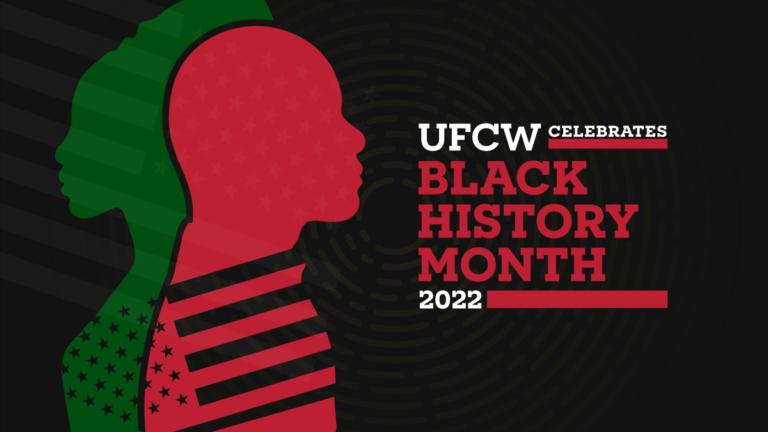
UFCW honors the African American leaders and community members who have fought for fair wages, dignity in the workplace, and equality. Despite the progress that many civil rights leaders made in spite of considerable barriers in the 1960’s, our country still faces systemic racism, threats to the Voting Rights Act, and many other setbacks to this progress.
The origins of Black History Month began in 1926, after historian Carter G. Woodson and other prominent African Americans dedicated the second week in February as “Negro History Week” to coincide with the birthdays of Abraham Lincoln and Frederick Douglass. In 1976, the celebration was officially recognized and expanded to span the entire month, and every U.S. president since then has celebrated Black History Month during the month of February.
Learn more about the prominent African American leaders who fought for fair wages, dignity in the workplace, and the freedom to organize in spite of considerable barriers, and honor their significant contributions to the labor movement.
Russell R. Lasley
United Packinghouse Workers of America (UPWA) Vice-President Russell R. Lasley (1914-1989) got his start as an officer in UPWA Local 46 in Waterloo, Iowa. After working at The Rath Packing Co, he went on to serve as vice president for the international union for more than 20 years becoming a critical figure in the American civil rights movement. After the UPWA merged with the Amalgamated Meat Cutters and Butcher Workmen to become UFCW, he became director of the merged union’s civil rights department.
The UPWA was one of the most progressive champions for civil rights in the labor movement during the 1950s and 1960s. The union began pursuing anti-discrimination activities in 1949 and formed an anti-discrimination department in 1950. The UPWA required every union local to have an anti-discrimination department, and the national union headquarters made certain that the local departments had their own programs in the meatpacking plants and communities. In addition to fighting for equality among workers, Lasley also fought against housing discrimination.
Addie Wyatt
Addie Loraine Cameron, better known as Addie L. Wyatt (1924 –2012) began working in the meatpacking industry in 1941. Although she applied for a job as a typist for Armour and Company, African American women were barred from holding clerical positions and she was sent to the canning department to pack stew in cans for the army. Due to a contract between Armour and the United Packinghouse Workers of America (UPWA), she earned more working on the packinghouse floor canning stew than she would have made working as a typist, and joined the UPWA after learning that the union did not discriminate against its members.
In 1953, she was elected vice president of UPWA Local 56 and a year later she became their first woman president. In the 1970s, she became the first female international vice president in the history of the Amalgamated Meat Cutters and Butcher Workmen and later served as director of its Human Rights and Women’s Affairs and Civil Rights Departments. She served as the first female African American international vice president of the UFCW after Amalgamated and the Retail Clerks International Union merged in 1979.
She and her husband were ordained ministers and founded the Vernon Park Church of God in Chicago. She played an integral role in the civil rights movement, and joined Dr. Martin Luther King, Jr. in major civil rights marches, including the March on Washington, the march from Selma to Montgomery, Alabama, and the demonstration in Chicago. She was one of the founders of the Coalition of Labor Union Women (CLUW), the country’s only national organization for union women. She was also a founding member of the Coalition of Black Trade Unionists and the National Organization of Women.
Bayard Rustin
Bayard Rustin was a champion of workers rights and in 1965, co-founded with his mentor A. Philip Randolph the A. Philip Randolph Institute (APRI), a labor organization for Black trade union members. Bayard Rustin was a civil rights activist who worked closely with the labor movement to ensure that Black workers were given their rightful place within the AFL-CIO. He was the organization’s executive director until 1972 and remained an honorary president until his death in 1987.
Often overlooked, Bayard was one of the driving forces behind The March on Washington of 1963. He helped to mobilize thousands of people of all races to attend the march – regardless of their social, racial and religious backgrounds. Dr. Martin Luther King, Jr. made one of his most inspiring and famous speeches at the march, which culminated on the National mall: I Have a Dream.
Although Bayard Rustin was was an important activist during the civil rights movement, he has been called the “lost prophet” of the civil rights movement because his work has been largely forgotten. This is largely because he was openly gay in a time when homophobia and bigotry was rampant. Rustin continued his life as an openly gay man, even after being incarcerated for it, and is still seen as a champion of the LGBTQ+ movement today. Despite facing a lot of difficulties and fired from various leadership positions, he continued participating in non-violent activism for both race and sexual identity equality until his death in 1987.
African American Women in a Texas Poultry Plant
Before a wave of automation and rapid restructuring would decimate jobs in the meatpacking industry, wages were 15 percent above the average wage for manufacturing workers in the United States, with the exception of the poultry industry, which had a much higher percentage of Black women workers.
In 1953, Black women working at the Eastex Poultry plant in Center, Texas, wrote to the Amalgamated Meat Cutters (which later became the UFCW) asking to join the union to fight for safer working conditions. They were fed up with the exploitation and unhealthy practices they witnessed on the job and had decided to form a union to better conditions at the plant.
The letter sparked a campaign led by Amalgamated Meat Cutters to try to get better working conditions in the plant. After the company refused to negotiate in good faith, the AMC organized a national boycott of plant products and the workers staged wildcat strikes that were marked by open violence as the strike touched off racial and class tensions.
After 11 months of tense negotiations between the union and the company, Eastex settled and agreed to wage increases, time-and-a-half overtime pay, three paid holidays and vacations, a grievance procedure, and reinstatement of workers who have been striked.
The Eastex Poultry plant organizing campaign brought to light widespread issues with food poisoning related to poultry standards. As part of these efforts, the Amalgamated Meat Cutters organized a national campaign to mandate federal inspection of poultry plants resulting in the passage of the Poultry Products Inspection Act in 1957.
Charles Hayes
Charles Hayes began his long career in union activism when he assisted organizing Local 1424 of the United Brotherhood of Carpenters and Joiners of America. Hayes served as president of the union from 1940 to 1942.
In the 1940’s, he joined the grievance committee of the United Packinghouse Workers of America (UPWA) and then became a UPWA field representative.
During his time at UPWA, he helped persuade the predominately white union based in Chicago, to establish its headquarters in the African American community. In addition to fight against segregated housing patterns in the city, Hayes helped to fundraise to prosecute the murderers of Emmett Till.
Hayes also worked with Martin Luther King, Jr. and the Southern Christian Leadership Council (SCLC) to advance the civil rights movement in Chicago. Hayes was one of the founding members of the Coalition of Black Trade Unionists (CBTU). From 1979 until his retirement in 1983, Hayes served as the international vice president of the United Food and Commercial Workers Union.
Hayes’ achievements did not stop there, Hayes was the first trade unionist ever elected to Congress. As a Congressman, Hayes was most noted for pieces of legislation to encourage school dropouts to re-enter and complete their education through the creation of federal job training and anti-poverty programs. He served five terms, from 1983 to 1993.
A. Philip Randolph
A. Philip Randolph is considered the father of the Black labor movement. He led the formation of the Brotherhood of Sleeping Car Porters, the first Black union, in 1925. In the 1930s, he led an organizing campaign against race discrimination in the defense industries and the U.S. armed forces.
When the AFL merged with the CIO in 1955, Randolph became a vice president and member of the executive council of the newly formed organization. From 1960-1966, he served as the first president of the Negro American Labor Council, a group part of the AFL-CIO to fight discrimination within organization.
In addition to workers’ rights, Randolph was an outspoken advocate for racial equality. He and fellow activist Bayard Rustin spearheaded the massive 1960 March on Washington for Jobs and Freedom. In 1966, Randolph and Bayard formed the A. Philip Randolph Institute for community leaders to study the causes of poverty.
Velma Hopkins
Velma Hopkins was a member of Local 22 of the Food, Tobacco, Agricultural and Allied Workers of America-CIO, an integrated union led primarily by African American women. In the 1940s, she helped mobilize 10,000 workers to take to the streets of Winston-Salem, NC, as part of an attempt to unionize the R.J. Reynolds Tobacco Company. “The union demanded the R.J. Reynolds Tobacco Co. improve conditions for its black workers, who endured oppressive heat and dangerous tobacco dust in their segregated work areas.” (AFL-CIO)
Local 22 gained national attention for its vision equality and inclusion as its organizing campaigns pushed the boundaries of economic, racial and gender. Unfortunately, the union was ultimately not successful after facing several set-backs caused by red-baiting and the power of Reynolds’ anti-unionism campaign.
Even though the organizing efforts failed to slay the giant, “Local 22 proved to be a model for other interracial labor movements that were to follow in the South during the 1940’s” (AFL-CIO North Carolina) influencing a generation of civil rights activists.
Hattie Canty
Hattie Canty was born in St. Stephens, Alabama in 1934. In 1964, she and her family moved to Las Vegas where she took a job as a maid and became involved in the Culinary Workers Union Local 226. In 1990, she became the first Black woman to be elected to be president of the Culinary Union.
“1991, the Culinary Workers began the longest labor strike in American history, with a walk off from the Frontier Hotel over unfair labor practices” (AFL-CIO). Six years later, the hotel’s new owner (Kansas industrialist Phil Ruffin) settled with the union.
Canty not only fought to make sure that working people got paid the living wages, she helped people of color obtain better jobs, integrated the union, and established the Culinary Training Academy, which teaches job skills necessary for employment in the hospitality industry (Online Nevada Encyclopedia).
Isaac Myers
Issac Myers was born a free man in 1835 in Baltimore, MD. At the age of 16, he learned the trade of a ship caulker and became the apprentice of a well-known Black ship caulker in the city, Thomas Jackson. Myers quickly moved up the ranks and by 20 he was in charge of his own crew.
Myers helped to increase the trade unionist movement within the Black community. In 1868, he became the president of the Colored Caulkers’ Trade Union Society of Baltimore where he reached out to Black union members in other trades and cities to join the newly formed National Labor Union.
Lucy Gonzales Parsons
Lucy Gonzales Parsons was born a slave in Texas and moved to Chicago after emancipation. In Chicago, Lucy and her husband became union organizers for some of the city’s industrial unions. “In 1886, the couple helped lead 80,000 working people in the world’s first May Day parade, demanding an eight-hour work day. After her husband was arrested, along with seven immigrant leaders during the Haymarket Riot, Parsons campaigned to free the men” (AFL-CIO)
Lucy was an unrelenting agitator, leading picket lines and speaking to workers’ audiences in the United States and England (Zinn Education Project) and was was labeled as “more dangerous than a thousand rioters.” In recognition of her decades of activism, she was the only woman to speak at the founding convention of the Industrial Workers of the World in 1905.
Dorothy Lee Bolden
Dorothy Lee Bolden was born in 1923 in Atlanta, GA, and began working as a domestic worker at the age of nine (BlackPast.org). In the 1960’s, her daily bus rides to her job in white neighborhoods became much more than just a way to get to work. Bolden used the bus rides to talk to other passengers about organizing a labor group that could fight for workplace rights. She wasn’t alone, women were fed up due to long hours of work for little pay, less respect, and few worker protections (The New York Times).
In 1968, Bolden was elected president of the National Domestic Workers Union of America (NDWUA), “one of the first formal organizations to support domestic workers in the country” (New York Historical Society). . Even though NDWUA was “not a formal union but an education and advocacy group, Bolden led the organization for nearly three decades and served more than 10,000 members around the country at its height” (New York Times).
“In the mid-1960s, Bolden worked with Dr. Martin Luther King and other civil rights leaders to confront police brutality, especially in her Atlanta neighborhood, Vine City” (BlackPast.org).
Bolden became an influential political leader in the 1970s. She was appointed to President Richard Nixon’s advisory committee on social services and welfare, and later consulted with Presidents Gerald Ford and Jimmy Carter administrations on workers’ rights.
Curt Flood
Curt Flood was an American baseball player and became one of the “pivotal figures in the sports labor history when he refused to accept a trade following the 1969 season, ultimately appealing his case to the U.S. Supreme Court” (AAREG.com). Flood was offered $100,00 salary by the Phillies “for the 1970 season, a $10,000 boost from his Cardinals salary. But for Flood, money wasn’t the issue. It was a matter of principle. Flood said that “a well-paid slave is, nonetheless, a slave””(The Nation).
In 1969, players were still bound to a team for life by the so-called reserve clause where a player was considered a team’s property, unless the team chose to trade or release him. A player’s first big-league team would be his only big-league team for his entire career.
“Although his legal challenge was unsuccessful, it brought about additional solidarity among players as they fought against baseball’s reserve clause and sought free agency” (AAREG.com).


